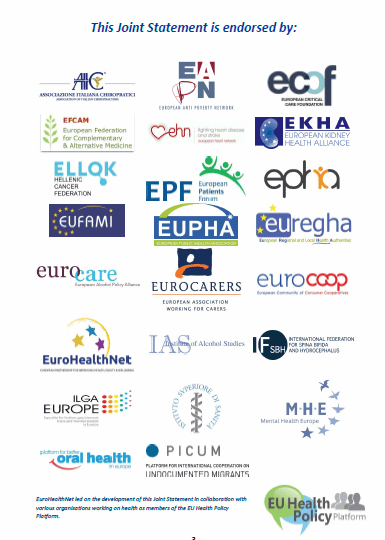Call for EU Actions on Health and Equity
Considering the high levels of health inequalities, within and between EU Member States
Considering the huge costs of health inequalities to society in terms of: individual well-being and satisfaction; reduction in people’s economic contributions; increases in health and social care expenses
Considering the challenge that health inequalities pose to the EU values of equality, solidarity and justice, and to its duty to promote good health:
We urge the European Institutions and EU Member State governments to recognise the central role that health and health equity play in building strong and sustainable social market economies and to stop thinking of health and well-being as a ‘small’ issue amongst EU policy priorities.
We also urge European Institutions and EU Member States to put health inequalities at the forefront of their health related priorities, as a topic in and of itself, and to place a stronger emphasis on health equity as an indicator, not only of how health systems are performing, but of how well Member States and the EU are delivering well-being for their people.
We have more insight than ever into what needs to be done to achieve better levels of health equity and action is being taken at EU level and in many constituent parts of the EU. This action has not, in most cases, been sufficient to make a difference. We therefore call on the EU Institutions and EU Member States to prioritise the following actions, to ensure that good health is not simply a prerogative of the well-off, but of everyone. This means:
- Adopting greater health equity as a strategic objective, and developing indicators and mechanisms to measure progress, integrating the evidence and perspectives of actors across sectors, including civil society.
- Strengthening and facilitating cooperation across sectors, at the EU and national levels, to deliver on sustainable development, better social protection and greater well-being. Ensuring that all relevant policy measures consider impact across socio-economic groups.
- Ensuring universal access to core health services for all, including marginalized populations like undocumented migrants, Roma, the LTBGI community and people with mental illness. This includes taking steps to modify regulations, legislation and policies that limit access to health care services. Limiting access to marginalised groups threatens public health, leads to overall health costs and violates fundamental rights. It also means finding effective solutions to unmet need for health professionals, and the migration of trained health professionals from poorer to wealthier parts of the EU.
- Valuing the contribution of all actors in health systems and ensuring that they have the necessary knowledge about health inequalities and the skills to deliver appropriate services that are person centered to address real need.
- Investing more in health promotion and disease prevention, and in improving health literacy, with a particular focus on reaching those people who face the greatest risk of ill health.
- Supporting the adoption of measures to prevent ill health across the population, like smoke free legislation and minimum unit pricing for alcohol, which have proved effective in reducing health inequalities.
- Investing in comparable disaggregated data at local, regional and national level that can be used to measure health inequalities, including those linked to sex, socioeconomic status, migration status, and national origin or ethnic background. Building capacities within health administrations and beyond to analyse this data and to evaluate measures that can contribute to reducing health inequalities.
- Improving the capacity of health professionals to recognise and effectively address social determinants of health and to play a ‘bridging role’ to ensure that other sectors deliver the best possible outcomes for people across the socio-economic gradient.
The EU institutions are in a unique position to encourage and support Member State action on health inequalities. They must make better use of the policy and funding mechanisms that they have available to them by:
- Harmonising existing Health System Performance Analysis (HSPA) tools and agreeing on common indicators and methodologies to assess national health system performances on health equity, in order to establish benchmarks and as a basis to compare good practices.
- Applying the European Semester process and issuing Country Specific Recommendations to countries demonstrating high or increasing levels of health inequalities, and engaging in dialogue with these countries on where and how they can improve.
- Encouraging the use of EU funding mechanisms like the European Structural and Investment Funds and the European Strategic Funds to improve the capacity of health systems to address health inequalities.
- Making health equity a central consideration of the proposed European Social Pillar, and mentioned as such from the outset. Ensuring careful consideration of how all measures in the pillar impact on people from different socio-economic groups and on reducing health inequalities.
The need to strengthen the health and social dimension of the EU, to avoid widening socio-economic inequalities within and between Member States is clearer today than ever before. Reducing health inequalities is possible. Doing so presents an opportunity to tangibly improve the lives of European citizens and will lead to more sustainable and resilient societies.
Masha Smirnova
Policy Coordinator for EU Semester and Social Pillar Project Manager FRESHER


